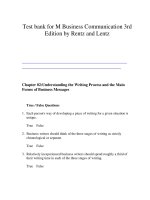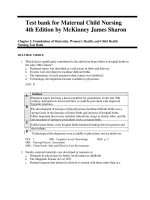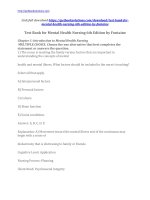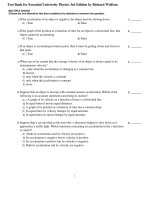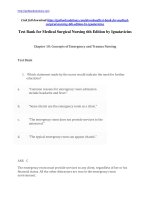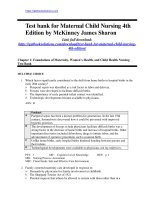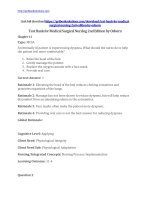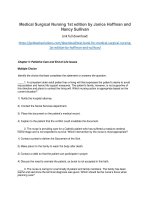Test bank for medical surgical nursing 3rd edition by dewit
Bạn đang xem bản rút gọn của tài liệu. Xem và tải ngay bản đầy đủ của tài liệu tại đây (45.56 KB, 6 trang )
Chapter 01: Caring for Medical-Surgical Patients
deWit: Medical-Surgical Nursing: Concepts & Practice, 3rd Edition
MULTIPLE CHOICE
1. Which statement accurately describes the primary purpose of the state nurse practice act (NPA)?
a. To test and license LPN/LVNs.
b. To define the scope of LPN/LVN practice.
c. To improve the quality of care provided by the LPN/LVN.
d. To limit the LPN/LVN employment placement.
ANS: B
While improving quality of care provided by the LPN/LVN may be a result of the NPA, the primary purpose of the NPA of each
state defines the scope of nursing practice in that state.
PTS: 1
DIF: Cognitive Level: Comprehension
REF: 2
OBJ: 3
TOP: NPA
KEY: Nursing Process Step: Implementation
MSC: NCLEX: Safe, Effective Care Environment: Coordinated Care
2. The charge nurse asks the new vocational nurse to start an intravenous infusion, a skill that the vocational nurse has not been taught
during her educational program. How should the vocational nurse respond?
a. Ask a more experienced nurse to demonstrate the procedure.
b. Look up the procedure in the procedure manual.
c. Attempt to perform the procedure with supervision.
d. Inform the charge nurse of her lack of training in this procedure.
ANS: D
The charge nurse should be informed of the lack of training to perform the procedure, and the vocational nurse should seek further
training to gain proficiency. Although the other options might be helpful, they are not safe.
Test Bank for Medical Surgical Nursing 3rd Edition by deWit
PTS: 1
DIF: Cognitive Level: Application
REF: 3
OBJ: 1
TOP:
Providing
Safe
Care
KEY:
Nursing Process Step: N/A
Full file at />MSC: NCLEX: Safe, Effective Care Environment: Coordinated Care
3. Which patient statement indicates a need for further discharge teaching that the vocational nurse should address?
a. “I have no idea of how this drug will affect me.”
b. “Do you know if my physician is coming back today?”
c. “Will my insurance pay for my stay?”
d. “Am I going to have to go to a nursing home?”
ANS: A
Lack of knowledge at discharge about medication effects and side effects is a concern that should be addressed by the vocational
nurse. The other concerns in the options are the responsibility of other departments to which the nurse might refer the patient.
PTS: 1
DIF: Cognitive Level: Application
REF: 2
OBJ: 1
TOP: Teaching
KEY: Nursing Process Step: Implementation
MSC: NCLEX: Safe, Effective Care Environment: Coordinated Care
4. According to most state NPAs, the vocational nurse acting as charge nurse in a long-term care facility acts in which capacity?
a. Working under direct supervision of an RN on the unit
b. Working with the RN in the building
c. Working under general supervision by the RN available on site or by phone
d. Working as an independent vocational nurse
ANS: C
The vocational nurse in the capacity of the charge nurse in a long-term care facility acts with the general supervision of an RN
available on site or by phone.
PTS: 1
DIF: Cognitive Level: Comprehension
REF: 2
OBJ: 1
TOP: Charge Nurse/Manager
KEY: Nursing Process Step: N/A
MSC: NCLEX: Safe, Effective Care Environment: Coordinated Care
5. The nurse is educating a patient that is a member of a health maintenance organization (HMO). Which information should the nurse
include?
a. Seek the opinion of an alternate health care provider.
b. Obtain insurance approval for medical services prior to treatment.
c. Provide detailed documentation of all care received for his condition.
d. Wait at least 6 months to see a specialist.
ANS: B
Most HMOs require preprocedure authorization for treatment. Patients are not required to seek a second opinion, provide
documentation of care, or wait a specific time period before visiting a specialist.
PTS:
OBJ:
KEY:
MSC:
1
DIF: Cognitive Level: Application
REF: 9
9
TOP: Charge Nurse/Manager
Nursing Process Step: Implementation
NCLEX: Safe, Effective Care Environment: Coordinated Care
Copyright © 2017 Elsevier Inc. All Rights Reserved.
1
Full file at />
6. The patient complains to the nurse that he is confused about his “deductible” that he owes the hospital. Which statement accurately
explains a deductible?
a. An amount of money put aside for the payment of future medical bills
b. A one-time fee for service
c. An amount of money deducted from the bill by the insurance company
d. An annual amount of money the patient must pay out-of-pocket for medical care
ANS: D
The deductible is the annual amount the insured must pay out-of-pocket prior to the insurance company assuming the cost. This
practice improves the profit of the insurance company.
PTS:
OBJ:
KEY:
MSC:
1
DIF: Cognitive Level: Comprehension
REF: 7
9
TOP: Health Care Financing
Nursing Process Step: Implementation
NCLEX: Safe, Effective Care Environment: Coordinated Care
7. The nurse compares the characteristics of a health maintenance organization (HMO) and a preferred provider organization (PPO).
Which information should the nurse include about HMOs?
a. HMOs require a set fee of each member monthly.
b. HMOs allow the member to select his health care provider.
c. HMOs permit admission to any facility the member prefers.
d. HMOs offer unlimited diagnostic tests and treatments.
ANS: A
HMOs require a set fee from each member monthly (capitation). The patient will be treated by the HMO staff in HMO-approved
facilities. Excessive use of diagnostic tests and treatments is discouraged by the HMO.
PTS:
OBJ:
KEY:
MSC:
1
DIF: Cognitive Level: Application
REF: 9
9
TOP: Managed Care
Nursing Process Step: Implementation
NCLEX: Safe,
Effective
Care
CoordinatedNursing
Care
Test
Bank
forEnvironment:
Medical Surgical
3rd
Edition by deWit
8. A patient asks the nurse what Medicare Part A covers. Which response is correct?
Full file at />a. Medicare Part A covers inpatient hospital costs.
b. Medicare Part A covers reimbursement to the physician.
c. Medicare Part A covers outpatient hospital services.
d. Medicare Part A covers ambulance transportation.
ANS: A
Medicare Part A covers inpatient hospital expenses, drugs, x-rays, laboratory work, and intensive care. Medicare Part B pays the
physician, ambulance transport, and outpatient services.
PTS:
OBJ:
KEY:
MSC:
1
DIF: Cognitive Level: Comprehension
REF: 7, Box 1-4
9
TOP: Government-Sponsored Health Insurance
Nursing Process Step: Implementation
NCLEX: Safe, Effective Care Environment: Coordinated Care
9. Which is the main cost-containment component of diagnosis-related groups (DRGs)?
a. Hospitals focus only on the specific diagnosis.
b. Hospitals treat and discharge patients quickly.
c. Reduced cost drugs are ordered for specific diagnoses.
d. Diagnostic group classification streamlines care.
ANS: B
DRGs are a prospective payment plan in which hospitals receive a flat fee for each patient’s diagnostic category regardless of the
length of time in the hospital. If hospitals can treat and discharge patients before the allotted time, hospitals get to keep the excess
payment; cost is contained, and the patient is discharged sooner.
PTS:
OBJ:
KEY:
MSC:
1
DIF: Cognitive Level: Comprehension
REF: 8
9
TOP: Government-Sponsored Health Insurance
Nursing Process Step: Implementation
NCLEX: Safe, Effective Care Environment: Coordinated Care
10. The nurse is assessing a group of patients. Which patient would most likely qualify for Medicaid?
a. A 35-year-old unemployed single mother with diabetes
b. A 70-year-old Medicare recipient with retirement income who needs to be in a
c.
d.
long-term care facility
An 80-year-old blind woman living in her own home who has inadequate private
insurance
A 67-year-old stroke victim with Medicare Part A and an income from
investments
ANS: A
Medicaid is a joint effort of federal and state governments geared primarily for low-income people with no insurance.
PTS:
OBJ:
KEY:
MSC:
1
DIF: Cognitive Level: Application
REF: 8, Box 1-5
9
TOP: Government-Sponsored Health Insurance–Medicaid
Nursing Process Step: Assessment
NCLEX: Safe, Effective Care Environment: Coordinated Care
Copyright © 2017 Elsevier Inc. All Rights Reserved.
2
Full file at />
11. Which area is the major focus of Healthy People 2020 and the primary mechanism through which to improve the health of
Americans in the second decade of the century?
a. Research funding
b. Health information distribution
c. Healthy lifestyle encouragement
d. Health improvement program designs
ANS: C
Healthy People 2020 focuses on expanding ongoing programs to include support and information to reduce infant mortality,
cancer, cardiovascular disease, and HIV/AIDS, and to increase effective immunizations, healthy eating habits, and healthy weight.
PTS:
OBJ:
KEY:
MSC:
1
DIF: Cognitive Level: Comprehension
REF: 6
7
TOP: Healthy People 2020
Nursing Process Step: Implementation
NCLEX: Safe, Effective Care Environment: Coordinated Care
12. Which term explains the type of care that addresses interventions for all dimensions of a patient’s life?
a. Focused care
b. General care
c. Directed care
d. Holistic care
ANS: D
Holistic care addresses the physiologic, psychological, social, cultural, and spiritual needs of the patient.
PTS:
OBJ:
KEY:
MSC:
1
DIF: Cognitive Level: Comprehension
8
TOP: Holistic Care
Nursing Process Step: Planning
NCLEX: Psychosocial Integrity: Coping and Adaptation
REF: 6
13. A patient furiously says, “My doctor was so busy giving me instructions that he didn’t hear what I was trying to ask him!” Which
Test Bank for Medical Surgical Nursing 3rd Edition by deWit
response is most empathetic?
a. “When people ignore me, I really get mad.”
Full file at />b. “I’m sure that the doctor was rushed and unaware of your needs.”
c. “I’ll bet that made you feel very frustrated.”
d. “Take a deep breath and plan what you will say to him tomorrow.”
ANS: C
Empathy demonstrates that the nurse perceives the patient’s feelings but does not share the emotion. Belittling the patient’s
feelings, showing sympathy, or defending the doctor makes the patient feel devalued.
PTS:
OBJ:
KEY:
MSC:
1
DIF: Cognitive Level: Analysis
10
TOP: Nurse–Patient Relationship
Nursing Process Step: Implementation
NCLEX: Psychosocial Integrity
REF: 10
14. The nurse is explaining differences in a therapeutic relationship and a social relationship to a patient. Which information about
therapeutic relationships is most important for the nurse to include in the explanation?
a. Therapeutic relationships lack formal boundaries.
b. Therapeutic relationships are goal directed.
c. Therapeutic relationships meet the needs of each person in the relationship.
d. Therapeutic relationships extend past the hospitalization period.
ANS: B
The therapeutic relationship is focused on the patient and is goal directed and designed to meet only the needs of the patient and
does not extend past the period of hospitalization.
PTS:
OBJ:
KEY:
MSC:
1
DIF: Cognitive Level: Comprehension
10
TOP: Therapeutic Relationship
Nursing Process Step: Implementation
NCLEX: Psychosocial Integrity
REF: 9
15. The long-term care facility nurse is caring for a newly admitted 80-year-old patient who is depressed. Which approach is best for
the nurse to employ?
a. Encourage the resident to engage in an activity.
b. Remind the resident of reasons to be positive.
c. Point out episodes of negative behavior.
d. Present a bright and cheerful behavior.
ANS: A
Activity and social interaction are helpful to depressed patients. Presenting a cheery approach and pointing out negative behavior
and reasons to be positive are not therapeutic at this stage of the relationship.
PTS:
OBJ:
KEY:
MSC:
1
DIF: Cognitive Level: Analysis
10
TOP: Depressed Behavior
Nursing Process Step: Implementation
NCLEX: Psychosocial Integrity
Copyright © 2017 Elsevier Inc. All Rights Reserved.
REF: 10
3
Full file at />
16. The nurse is caring for a patient who has been on antidepressants for 3 days. The patient tearfully says, “I still feel terrible. I don’t
think anything can help how I feel.” Which response is best?
a. “I will tell the charge nurse how you are feeling.”
b. “You just need to be patient and give your medicine some time to work.”
c. “Look how much you have improved since you were admitted to the facility.”
d. “It must be frustrating to be going through this difficult time.”
ANS: D
This response is an empathetic response that allows for further exploration of the patient’s feelings. The other responses will block
communication with this patient.
PTS:
OBJ:
KEY:
MSC:
1
DIF: Cognitive Level: Application
10
TOP: Therapeutic Communication
Nursing Process Step: Implementation
NCLEX: Psychosocial Integrity
REF: 9
17. An overweight male patient rips off his hospital gown, throws it out the door, and shouts, “I’m not wearing this stupid gown! It is
too small, too short, and exposes my backside to the world!” Which response is most appropriate?
a. Remind patient of the need to wear the gown for convenience in care.
b. Confer with the patient for methods to acquire a larger gown.
c. Replace the torn gown with another.
d. Inform the charge nurse of the hostile behavior.
ANS: B
Allowing hostile patients to make reasonable requests defuses the anger and allows patients to vent their feelings.
PTS:
OBJ:
KEY:
MSC:
1
DIF: Cognitive Level: Application
10
TOP: Hostile Behavior
Nursing Process Step: Implementation
NCLEX: Psychosocial Integrity: Coping and Adaptation
REF: 9
Test Bank for Medical Surgical Nursing 3rd Edition by deWit
18. The nurse is caring for a patient who states, “You are the only nurse who understands about my pain. Can’t you give me an extra
dose of pain medication?” How should the nurse respond to the patient’s request?
Full file at />a. Explain that dosage schedules are by physician’s orders.
b. Ignore the request.
c. Tell the patient that his behavior is manipulative.
d. Agree to give an extra dose of pain medication.
ANS: A
A matter-of-fact response to a manipulative request limits the effect of the manipulation, thereby helping the nurse to avoid
becoming defensive or being swayed by flattery.
PTS:
OBJ:
KEY:
MSC:
1
DIF: Cognitive Level: Application
10
TOP: Manipulative Behavior
Nursing Process Step: Implementation
NCLEX: Psychosocial Integrity
REF: 9
19. A female patient who has recently been diagnosed with an inoperable brain tumor asks the nurse, “Do you think God punishes us?”
Which response demonstrates therapeutic communication?
a. “What do you think?”
b. “God loves you.”
c. “Would like to speak with the chaplain?”
d. “God will not give you more than you can bear.”
ANS: A
Sitting with the patient and offering oneself to listen to the patient’s concerns and encouraging reflection is the best approach rather
than responding with a cliché or suggesting speaking with the chaplain.
PTS:
OBJ:
KEY:
MSC:
1
DIF: Cognitive Level: Application
10
TOP: Spiritual Care
Nursing Process Step: Implementation
NCLEX: Psychosocial Integrity
REF: 10
20. The nurse is communicating with a patient who voices concern about an upcoming high-risk procedure. Which statement best
demonstrates empathy?
a. “Would you like to talk about your feelings regarding the procedure?”
b. “My mother had the same procedure and did very well.”
c. “I can’t imagine how you feel.”
d. “It must be difficult preparing for the procedure; how are you feeling?”
ANS: D
This statement by the nurse displays empathy by trying to place oneself in the patient’s circumstance and validating the patient’s
feelings. Simply asking patients if they would like to talk about their feelings does not show empathy and may elicit a “yes” or
“no” response. Telling the patient one’s mother had the procedure or stating “I can’t imagine how you feel” does not show empathy
toward the patient.
PTS:
OBJ:
KEY:
MSC:
1
DIF: Cognitive Level: Application
10
TOP: Nurse–Patient Relationship
Nursing Process Step: Implementation
NCLEX: Psychosocial Integrity
Copyright © 2017 Elsevier Inc. All Rights Reserved.
REF: 10
4
Full file at />
MULTIPLE RESPONSE
21. Which of the following are sources of clear guidelines for upholding clinical standards for safe and competent care? (Select all that
apply.)
a. The state’s nurse practice act (NPA)
b. The State Board of Nurse Examiners (BNE)
c. The National Association for Practical Nurse Education and Service (NAPNES)
d. Institutional policies
e. The National Federation of Licensed Practical Nurses, Inc. (NFLPN)
ANS: C, E
NAPNES and the NFLPN give clear guidelines for clinical standards that can be used as a basis for court decisions. The NPA has
broad guidelines, and institutional policies may not be complete. The BNE enforces the NPA.
PTS: 1
DIF: Cognitive Level: Comprehension
REF: 5
OBJ: 3
TOP: Upholding Clinical Standards
KEY: Nursing Process Step: N/A
MSC: NCLEX: Safe, Effective Care Environment: Coordinated Care
22. Which statement(s) accurately describes the role of the LPN/LVN regardless of employment placement? (Select all that apply.)
a. Uphold clinical standards
b. Educate patients
c. Communicate effectively
d. Collaborate with the health care team
e. Initiate a care plan immediately after admission
ANS: A, B, C, D
The LPN/LVN has the accountability to uphold clinical standards, educate patients, communicate effectively, and collaborate with
the health care team. Depending on the type of facility, initiation of a care plan is often the role of the registered nurse.
PTS:
OBJ:
KEY:
MSC:
1
DIF: Cognitive Level: Comprehension
REF: 2
3
TOP:
Roles
of
LPN/LVNs
Test Bank for Medical Surgical Nursing 3rd
Nursing Process Step: Implementation
NCLEX: Safe, Effective Care Environment: Coordinated Care
Edition by deWit
Full file at />
23. The newly licensed LPN/LVN demonstrates an understanding of employment opportunities when applying to a position in which
area(s)? (Select all that apply.)
a. An outpatient clinic
b. A home health care agency
c. An intravenous (IV) therapy team
d. A long-term care facility
e. An ambulatory care unit
ANS: A, B, D, E
With the exception of an IV therapy team, which requires postgraduate education and/or certification, the other options are open to
newly graduated vocational nurses.
PTS:
OBJ:
KEY:
MSC:
1
DIF: Cognitive Level: Application
REF: 2
2
TOP: Employment Opportunities for LPN/LVNs
Nursing Process Step: N/A
NCLEX: Safe, Effective Care Environment: Coordinated Care
24. What factor(s) should the LPN/LVN consider when delegating a task to unlicensed assistive personnel (UAP)? (Select all that
apply.)
a. A need for the UAP to voluntarily accept the task delegated
b. Continued accountability for the task by the LPN/LVN
c. Assurance that the task requires no further need for supervision of the UAP
d. An understanding that the task is in the job description of the UAP
e. A transfer of authority to the UAP
ANS: A, B, D, E
Delegation is a considered act involving the condition of the patient and the competency of the UAP. Delegation requires that the
UAP voluntarily accept the task, which is in the job description of the UAP. The vocational nurse has transferred authority for the
completion of the task but is still accountable and should supervise.
PTS: 1
DIF: Cognitive Level: Application
REF: 3
OBJ: 1
TOP: Delegation
KEY: Nursing Process Step: N/A
MSC: NCLEX: Safe, Effective Care Environment: Coordinated Care
Copyright © 2017 Elsevier Inc. All Rights Reserved.
5
Full file at />
25. The LPN/LVN participates in an in-service about cost containment within the health care facility. Which action(s) demonstrate
understanding of cost-containment principles? (Select all that apply.)
a. Telling patients to limit their usage of supplies.
b. Asking the UAP to ensure correct charges for patient care items.
c. Only using necessary items for patient care.
d. Charging for extra patient care items that the patient may take home upon
discharge.
e. Documenting supplies used for patients in their patient care record.
ANS: B, C, E
The UAP must correctly charge patients utilizing the facility’s charging system, only necessary supplies should be used for patient
care, and documenting supplies used assists in reimbursement. It is inappropriate and not the patient’s responsibility to monitor
their supply use, and excess charges would be incurred if items were given to the patient upon discharge.
PTS:
OBJ:
KEY:
MSC:
1
DIF: Cognitive Level: Application
REF: 6
8
TOP: Cost Containment
Nursing Process Step: Implementation
NCLEX: Safe, Effective Care Environment: Management of Care
COMPLETION
26. When an insurance company directly reimburses a licensed health care provider for services, the form of financing is called
______________.
ANS:
fee for service
Fee for service is the direct reimbursement by an insurance company to a health care provider.
PTS: 1
DIF:Bank
Cognitive
Level: Comprehension
Test
for Medical
Surgical
OBJ: 9
TOP: Health Care Financing
MSC: NCLEX: N/A
REF: 7 3rd Edition by deWit
Nursing
KEY: Nursing Process Step: N/A
Full file at />
27. The nurse explains that the term _____________ refers to the severity of illness.
ANS:
acuity
Acuity is the term referring to the severity of illness or condition of a patient.
PTS: 1
DIF: Cognitive Level: Knowledge
REF: 4
OBJ: 6
TOP: Acuity
KEY: Nursing Process Step: Implementation
MSC: NCLEX: Safe, Effective Care Environment: Coordinated Care
Copyright © 2017 Elsevier Inc. All Rights Reserved.
6
Full file at />

